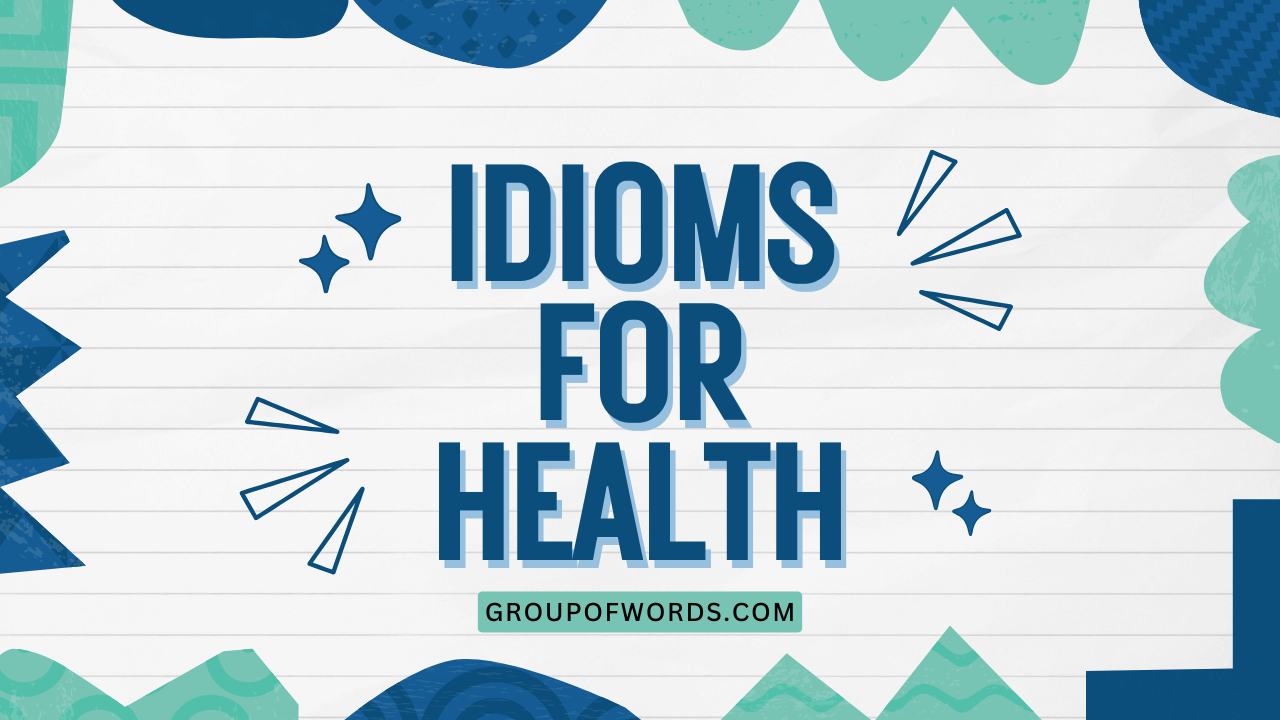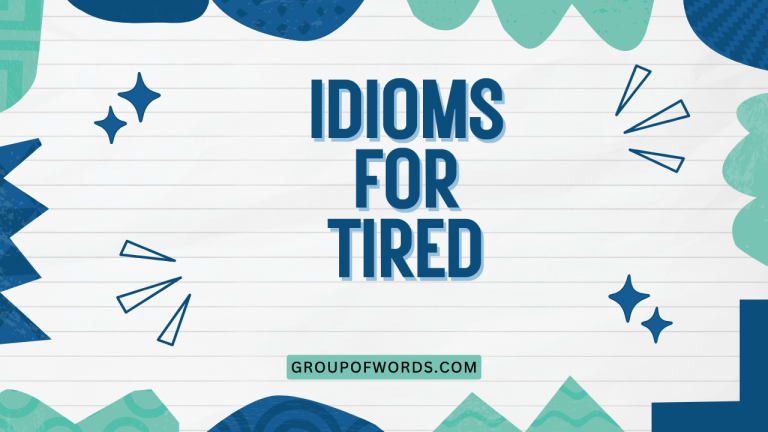Idioms for Health: Mastering English Expressions
Understanding idioms is crucial for mastering English, as they add color and nuance to everyday conversations. Idioms related to health are particularly common and can help you express yourself more vividly when discussing physical or mental well-being.
This article provides a comprehensive guide to health-related idioms, covering their definitions, usage, and examples, making it an invaluable resource for English learners of all levels.
This guide will benefit anyone looking to improve their English language skills, especially those preparing for language proficiency exams or aiming to communicate more effectively in professional or personal settings. By the end of this article, you’ll have a solid grasp of various health idioms and be able to use them confidently in your speech and writing.
Table of Contents
- Introduction
- Definition of Idioms for Health
- Structural Breakdown
- Types and Categories of Health Idioms
- Examples of Health Idioms
- Usage Rules for Health Idioms
- Common Mistakes with Health Idioms
- Practice Exercises
- Advanced Topics
- FAQ
- Conclusion
Definition of Idioms for Health
An idiom is a phrase or expression whose meaning cannot be understood from the literal meanings of the individual words. Instead, it has a figurative meaning known through common usage.
Idioms related to health specifically refer to expressions that describe physical, mental, or emotional well-being, illness, recovery, or healthy habits.
These idioms add depth and color to discussions about health, allowing speakers and writers to convey complex ideas in a concise and engaging manner. They are an essential part of everyday English conversation and understanding them is crucial for effective communication.
Idioms often fall into categories based on the type of health aspect they describe, such as physical ailments, mental states, or lifestyle choices. Recognizing these categories can help learners grasp the nuances of each idiom and use them more accurately.
Structural Breakdown
The structure of health idioms varies widely. Some idioms are simple phrases, while others are more complex clauses.
Understanding the grammatical structure can provide clues, although the meaning is always figurative. It’s important not to interpret them word-for-word.
Many idioms contain verbs, nouns, adjectives, and prepositions. The combination of these elements creates a unique meaning that is different from their individual definitions.
For example, the idiom “under the weather” uses a prepositional phrase to describe a feeling of illness. The structure itself doesn’t directly tell you “ill,” but the phrase as a whole communicates that meaning.
Idioms often rely on metaphors and similes to convey their meaning. For example, “as fit as a fiddle” uses a simile to compare someone’s health to the good condition of a musical instrument.
This metaphorical comparison helps to illustrate the idea of being in excellent health.
Types and Categories of Health Idioms
Health idioms can be broadly categorized based on the aspect of health they describe. This classification helps in understanding and using them appropriately.
Physical Health Idioms
These idioms relate to the physical condition of the body, including illnesses, injuries, and physical strength.
Mental and Emotional Health Idioms
These idioms describe mental states, emotional well-being, stress, and psychological conditions.
Recovery and Healing Idioms
These idioms pertain to the process of getting better after an illness or injury, and regaining health.
Healthy Lifestyle Idioms
These idioms relate to habits and practices that promote good health, such as exercise, diet, and self-care.
Examples of Health Idioms
Understanding health idioms requires seeing them in context. The following examples demonstrate how these idioms are used in sentences, categorized by their respective health aspects.
Physical Health Examples
The following table provides examples of idioms related to physical health, along with their meanings and example sentences. These idioms are frequently used in everyday conversation to describe physical well-being, illness, or injury.
By studying these examples, you can enhance your understanding and usage of English idioms in health-related contexts. Understanding the nuances of each idiom will improve your ability to communicate effectively and add depth to your conversations about health.
Each idiom’s meaning is explained, and example sentences are provided to illustrate their usage.
| Idiom | Meaning | Example Sentence |
|---|---|---|
| Under the weather | Feeling unwell or slightly ill | I’m feeling a bit under the weather today, so I’m staying home from work. |
| As fit as a fiddle | In excellent physical condition | Despite being over 70, my grandfather is as fit as a fiddle. |
| A clean bill of health | Official confirmation of good health after a medical examination | After the check-up, the doctor gave him a clean bill of health. |
| Kick the bucket | To die (informal) | He was determined to travel the world before he kicked the bucket. |
| At death’s door | Very close to dying | After the severe accident, he was at death’s door, but he miraculously recovered. |
| Black and blue | Covered in bruises | After falling down the stairs, her legs were black and blue. |
| Run-down | Feeling tired and in poor health | She’s been feeling run-down lately due to stress at work. |
| A splitting headache | A very severe headache | I have a splitting headache; I need to take some painkillers. |
| On the mend | Recovering from an illness or injury | After the surgery, he is slowly on the mend. |
| Full of beans | Energetic and lively | The kids were full of beans after their nap. |
| To feel out of sorts | To feel slightly unwell or unhappy | I’ve been feeling out of sorts all day; I think I need some rest. |
| Aches and pains | Minor physical discomforts | As you get older, you start to get more aches and pains. |
| To be back on one’s feet | To have recovered from an illness or difficulty | It took a while, but he’s finally back on his feet after the flu. |
| To be in bad shape | To be in poor physical condition | After years of neglect, the old car was in bad shape. |
| To be under the knife | To undergo surgery | He had to go under the knife to repair his torn ligament. |
| To have a frog in one’s throat | To have difficulty speaking due to a throat irritation | I couldn’t sing because I had a frog in my throat. |
| To be as right as rain | To be perfectly well again | After a good night’s sleep, I felt as right as rain. |
| To be on one’s last legs | To be near the end of one’s life or usefulness | That old computer is on its last legs; it needs replacing. |
| To fight a losing battle | To try to do something that is impossible | They were fighting a losing battle trying to save the old tree. |
| To breathe one’s last | To die | The old king breathed his last surrounded by his family. |
| To be a shadow of one’s former self | To be much weaker or less healthy than before | After the illness, he was a shadow of his former self. |
| To turn up one’s toes | To die (informal) | He joked that he wouldn’t turn up his toes anytime soon. |
| To be pushing up daisies | To be dead and buried (humorous) | He said he’d be pushing up daisies before he retired. |
| To feel like death warmed over | To feel extremely ill | After the long flight, I felt like death warmed over. |
Mental and Emotional Health Examples
The following table presents idioms related to mental and emotional health, offering insights into their meanings and practical usage. These idioms are essential for expressing emotional states, levels of stress, and overall mental well-being in English.
Understanding these expressions can significantly enhance your ability to communicate about mental health topics in a nuanced and empathetic way. By mastering these idioms, you can articulate feelings and experiences with greater precision and clarity.
| Idiom | Meaning | Example Sentence |
|---|---|---|
| To be on edge | To be nervous or anxious | She was on edge waiting for the exam results. |
| To blow off steam | To release pent-up emotions or energy | He goes to the gym to blow off steam after a stressful day. |
| To be down in the dumps | To feel sad or depressed | She’s been down in the dumps since she lost her job. |
| To be stressed out | To be under a lot of stress | I’m completely stressed out with all this work. |
| To be at the end of one’s rope | To have no more patience or endurance | With the constant demands, she felt like she was at the end of her rope. |
| To have a nervous breakdown | To suffer a period of mental illness | The pressure at work caused him to have a nervous breakdown. |
| To be off one’s rocker | To be crazy or eccentric | He’s off his rocker if he thinks that’s a good idea. |
| To keep one’s chin up | To stay positive and hopeful | Even though things are tough, you need to keep your chin up. |
| To be beside oneself | To be extremely upset and anxious | She was beside herself with worry when her child went missing. |
| To lose one’s mind | To become mentally unstable | He almost lost his mind when he heard the news. |
| To be a basket case | To be emotionally unstable or overwhelmed | After the disaster, she was a complete basket case. |
| To be climbing the walls | To be restless and anxious | The kids were climbing the walls waiting for the rain to stop. |
| To be tearing one’s hair out | To be extremely frustrated | I was tearing my hair out trying to fix the computer. |
| To be on cloud nine | To be extremely happy | She’s been on cloud nine since she got engaged. |
| To be feeling blue | To feel sad | I’m feeling blue today because it’s raining. |
| To have a weight lifted off one’s shoulders | To feel relieved after a burden is removed | I had a weight lifted off my shoulders when I finished the project. |
| To be pulling one’s hair out | To be very stressed or frustrated | I’ve been pulling my hair out trying to understand this problem. |
| To be driving someone up the wall | To irritate or annoy someone greatly | His constant complaining is driving me up the wall. |
| To be as cool as a cucumber | To be very calm and composed | Despite the chaos, he was as cool as a cucumber. |
| To be a bundle of nerves | To be very nervous | She was a bundle of nerves before her presentation. |
| To get something off one’s chest | To express something that has been bothering you | I needed to get it off my chest and tell her how I felt. |
| To be skating on thin ice | To be in a risky situation | He’s skating on thin ice with his boss after being late so often. |
| To be walking on eggshells | To be very careful not to offend someone | I feel like I’m walking on eggshells around him since the argument. |
| To have a short fuse | To get angry easily | He has a short fuse, so be careful what you say. |
| To be at peace | To be calm and content | She finally felt at peace after years of turmoil. |
Recovery and Healing Examples
The following table showcases idioms related to recovery and healing, providing their meanings and example sentences. These idioms are particularly useful when discussing the process of recuperating from illness, injury, or emotional distress.
Understanding and using these expressions can add depth and empathy to your conversations about health and recovery. These idioms can help you express support and encouragement to others who are going through challenging times.
Each idiom’s meaning is explained, and example sentences are provided to illustrate their usage.
| Idiom | Meaning | Example Sentence |
|---|---|---|
| On the road to recovery | Making progress towards getting better | After the surgery, he is on the road to recovery. |
| To be back on one’s feet | To have recovered from an illness or difficulty | It took a while, but he’s finally back on his feet after the flu. |
| To bounce back | To recover quickly from a setback or illness | She always manages to bounce back from any challenge. |
| To turn the corner | To pass the critical point and start to improve | The doctor said he’s turned the corner and is now recovering well. |
| To be out of the woods | To be past the most dangerous part of an illness or difficulty | He’s not completely out of the woods yet, but he’s improving. |
| To heal with time | To recover emotionally over a period of time | The pain of losing a loved one will heal with time. |
| To nurse someone back to health | To care for someone until they recover | She nursed him back to health after his accident. |
| To patch someone up | To give basic medical treatment to someone | The medic patched up the injured soldiers on the battlefield. |
| To mend fences | To restore friendly relations after a quarrel | They tried to mend fences after the argument. |
| To get over something | To recover from an illness or emotional shock | It took her a long time to get over the loss of her pet. |
| To shake something off | To recover from a minor illness or bad mood | I just need to shake off this cold and I’ll be fine. |
| To be on the mend | To be recovering from an illness or injury | After the surgery, he is slowly on the mend. |
| To pull through | To recover from a serious illness or injury | Despite the severity of his injuries, he managed to pull through. |
| To come around | To recover consciousness | After the operation, it took him a while to come around. |
| To be as good as new | To be fully recovered or restored | After the repairs, the car was as good as new. |
| To turn a new leaf | To start behaving in a better way | He decided to turn a new leaf and quit smoking. |
| To be on the up and up | To be improving steadily | His health has been on the up and up since he started exercising. |
| To rise from the ashes | To recover from a disaster or setback | The company rose from the ashes after the bankruptcy. |
| To lick one’s wounds | To take time to recover from a defeat or disappointment | After the failed project, he needed time to lick his wounds. |
| To get back in the saddle | To resume an activity after a break | After the injury, it took him a while to get back in the saddle. |
| To get a new lease on life | To experience a renewed sense of energy or purpose | After surviving the illness, he felt like he had a new lease on life. |
| To come out stronger | To emerge from a difficult situation with increased resilience | She came out stronger after facing her fears. |
| To put something behind you | To move on from a negative experience | It’s important to put the past behind you and focus on the future. |
| To see the light at the end of the tunnel | To see signs that a difficult situation is improving | After months of hard work, they were finally seeing the light at the end of the tunnel. |
| To pick up the pieces | To try to return to normal after a disaster or setback | After the storm, the community had to pick up the pieces. |
Healthy Lifestyle Examples
The following table presents idioms related to maintaining a healthy lifestyle, providing their meanings and example sentences. These idioms are valuable when discussing habits and practices that promote good health, such as exercise, diet, and self-care.
Understanding and using these expressions can add depth to your conversations about health and wellness. These idioms can help you encourage and motivate others to adopt a healthier lifestyle.
Each idiom’s meaning is explained, and example sentences are provided to illustrate their usage.
| Idiom | Meaning | Example Sentence |
|---|---|---|
| To be in good shape | To be in good physical condition | He goes to the gym regularly to stay in good shape. |
| To watch one’s weight | To be careful about what one eats to avoid gaining weight | She’s watching her weight by avoiding sugary foods. |
| To burn the candle at both ends | To work or do too much, leading to exhaustion | He’s been burning the candle at both ends trying to finish the project. |
| To recharge one’s batteries | To rest and relax to regain energy | I need to go on vacation to recharge my batteries. |
| To take a chill pill | To calm down and relax (informal) | You need to take a chill pill and stop worrying so much. |
| To take it easy | To relax and avoid overexertion | The doctor told him to take it easy after the surgery. |
| To lead a healthy life | To follow practices that promote good health | She leads a healthy life by eating well and exercising. |
| To cut back on something | To reduce consumption of something unhealthy | I’m trying to cut back on coffee to sleep better. |
| To pig out | To eat a large amount of food (informal) | We pigged out on pizza last night. |
| To eat like a horse | To eat a large amount of food | Teenage boys often eat like a horse. |
| To have a sweet tooth | To enjoy eating sweet foods | She has a sweet tooth and loves chocolate. |
| To be a couch potato | To spend a lot of time sitting and watching television | He’s become a couch potato since he retired. |
| To work up a sweat | To exercise vigorously | I worked up a sweat at the gym this morning. |
| To get into shape | To improve one’s physical condition | He’s trying to get into shape for the summer. |
| To kick a habit | To stop doing something harmful | He’s trying to kick the habit of smoking. |
| To go cold turkey | To stop an addictive habit abruptly | He decided to go cold turkey and quit smoking immediately. |
| To take care of oneself | To look after one’s health and well-being | It’s important to take care of yourself by getting enough sleep. |
| To stay on one’s feet | To remain healthy and active | She’s determined to stay on her feet as she gets older. |
| To keep in trim | To stay in good physical condition | He keeps in trim by running every day. |
| To be as healthy as a horse | To be very healthy | She’s as healthy as a horse and never gets sick. |
| To live life to the fullest | To enjoy life as much as possible | After surviving cancer, she decided to live life to the fullest. |
| To get a new lease on life | To experience a renewed sense of energy or purpose | After retiring, he felt like he got a new lease on life. |
| To be fit as a butcher’s dog | To be very healthy | He’s as fit as a butcher’s dog despite his age. |
| To have a balanced diet | To eat a variety of healthy foods | She tries to have a balanced diet with plenty of fruits and vegetables. |
| To get moving | To start exercising | It’s time to get moving and go for a walk. |
Usage Rules for Health Idioms
Using idioms correctly requires understanding their specific contexts and nuances. Here are some key rules to keep in mind:
- Context is Key: Always consider the situation and audience when using idioms. Some idioms are informal and may not be appropriate for formal settings.
- Literal vs. Figurative: Remember that idioms have a figurative meaning, not a literal one. Avoid interpreting the words individually.
- Correct Form: Use the idiom in its correct grammatical form. Changing the words or structure can alter the meaning or make it nonsensical.
- Cultural Sensitivity: Be aware that some idioms may not translate well across cultures or may have different connotations in different regions.
- Practice: The best way to learn idioms is through exposure and practice. Read widely, listen to native speakers, and try using idioms in your own speech and writing.
For example, using “kick the bucket” in a solemn setting would be inappropriate due to its informal and somewhat humorous tone. Similarly, misusing “under the weather” by saying “over the weather” would not convey the intended meaning.
It’s also important to pay attention to verb tenses and subject-verb agreement when using idioms. For instance, “He is feeling under the weather” is correct, while “He are feeling under the weather” is incorrect.
Common Mistakes with Health Idioms
Learners often make mistakes when using idioms due to their non-literal nature. Here are some common errors and how to avoid them:
| Incorrect | Correct | Explanation |
|---|---|---|
| I’m feeling over the weather. | I’m feeling under the weather. | The correct idiom is “under the weather,” not “over.” |
| He is fit like a fiddle. | He is as fit as a fiddle. | The correct idiom uses “as…as” for comparison. |
| She got a clean health bill. | She got a clean bill of health. | The words in the idiom must be in the correct order. |
| They are in the end of their rope. | They are at the end of their rope. | The correct preposition is “at,” not “in.” |
| He is climbing on the walls. | He is climbing the walls. | The preposition “on” is not used in this idiom. |
| She is tearing her hairs out. | She is tearing her hair out. | “Hair” is usually uncountable, so it doesn’t take a plural form. |
| I have a weight lift off my shoulders. | I have a weight lifted off my shoulders. | The correct form is “lifted,” not “lift.” |
| He is on the street to recovery. | He is on the road to recovery. | The correct word is “road,” not “street.” |
| She is bouncing back quick. | She is bouncing back quickly. | Use the adverb “quickly” to modify the verb “bouncing.” |
| Take a cool pill. | Take a chill pill. | The correct idiom is “chill pill,” not “cool pill.” |
By paying attention to these common mistakes and practicing the correct usage, you can avoid errors and use health idioms with confidence.
Practice Exercises
Test your understanding of health idioms with these exercises. Choose the correct idiom to complete each sentence.
Exercise 1: Fill in the Blanks
| Question | Options | Answer |
|---|---|---|
| 1. After the marathon, he was __________. | a) full of beans, b) run-down, c) as fit as a fiddle | b) run-down |
| 2. She’s been __________ since she started her new job. | a) on cloud nine, b) down in the dumps, c) on edge | a) on cloud nine |
| 3. He had to __________ after his knee injury. | a) kick the bucket, b) go under the knife, c) breathe his last | b) go under the knife |
| 4. I need to __________ after a long week at work. | a) burn the candle at both ends, b) recharge my batteries, c) work up a sweat | b) recharge my batteries |
| 5. He’s trying to __________ smoking. | a) pig out, b) kick a habit, c) watch his weight | b) kick a habit |
| 6. After the argument, they needed to __________ | a) mend fences, b) blow off steam, c) lose their minds | a) mend fences |
| 7. She’s been __________ waiting for her medical test results. | a) as cool as a cucumber, b) on edge, c) at peace | b) on edge |
| 8. The doctor said he’s __________ and will recover soon. | a) turned the corner, b) pushing up daisies, c) under the weather | a) turned the corner |
| 9. He’s __________ because he eats junk food all the time. | a) in good shape, b) as healthy as a horse, c) in bad shape | c) in bad shape |
| 10. She decided to __________ and start exercising regularly. | a) get moving, b) pig out, c) watch her weight | a) get moving |
Exercise 2: True or False
| Statement | Answer |
|---|---|
| 1. “To be on cloud nine” means to feel sad. | False |
| 2. “To kick the bucket” is a formal way to say someone has died. | False |
| 3. “To be as fit as a fiddle” means to be in excellent physical condition. | True |
| 4. “To burn the candle at both ends” means to relax and take it easy. | False |
| 5. “To take a chill pill” means to get angry and stressed. | False |
| 6. “To be under the weather” means to feel slightly ill. | True |
| 7. “To have a sweet tooth” means to dislike sweet foods. | False |
| 8. “To be a couch potato” means to be very active and energetic. | False |
| 9. “To be on the mend” means to be recovering from an illness. | True |
| 10. “To be at peace” means to be calm and content. | True |
Exercise 3: Matching
| Idiom | Meaning |
|---|---|
| 1. To be run-down | A. To be exhausted and in poor health |
| 2. To be on edge | B. To be very nervous and anxious |
| 3. To blow off steam | C. To release pent-up emotions |
| 4. To be down in the dumps | D. To feel sad or depressed |
| 5. To recharge one’s batteries | E. To rest and regain energy |
Answers: 1-A, 2-B, 3-C, 4-D, 5-E
Advanced Topics
For advanced learners, exploring the origins and cultural contexts of health idioms can provide a deeper understanding. Many idioms have historical roots or are derived from specific cultural practices.
For example, the idiom “as fit as a fiddle” originates from the idea that a well-tuned fiddle (violin) is in perfect condition. Understanding this origin can add depth to your appreciation of the idiom.
Additionally, analyzing how health idioms are used in literature and media can provide insights into their stylistic and rhetorical effects. Authors and speakers often use idioms to add color, humor, or emphasis to their messages.
Consider exploring regional variations of health idioms. Different English-speaking countries may have their own unique expressions for describing health and well-being.
FAQ
- Q: Are idioms the same as slang?
- A: No, idioms are different from slang. Idioms are established expressions with figurative meanings, while slang is informal language that is often specific to a particular group or generation.
- Q: Can I use idioms in formal writing?
- A: It depends on the idiom and the context. Some idioms are appropriate for formal writing, while others are too informal. Consider your audience and purpose when deciding whether to use an idiom.
- Q: How can I learn more idioms?
- A: Read widely, listen to native speakers, and use idiom dictionaries or online resources. Practice using idioms in your own speech and writing.
- Q: Are idioms universal across languages?
- A: No, idioms are not universal. Each language has its own set of idioms that may not translate directly into other languages. Understanding idioms requires learning them in their specific linguistic and cultural context.
- Q: What should I do if I don’t understand an idiom?
- A: Ask for clarification or look it up in a dictionary. Pay attention to the context in which the idiom is used, as this can provide clues to its meaning.
Conclusion
Mastering health idioms is a valuable step in improving your English language skills. By understanding the definitions, usage rules, and common mistakes associated with these expressions, you can communicate more effectively and add depth to your conversations about health and well-being.
Continue to practice using health idioms in your speech and writing, and explore their cultural and historical origins to deepen your understanding. With consistent effort, you’ll become more confident and fluent in using these colorful expressions.






